This Guy Saved A Kitty From A Terrible Owner But Felt Guilty About Exposing The Ex-Owner
Hearing stories of people not taking care of their pets is always difficult. The worst part is that the pattern of abuse will continue if that person decides to get more pets.
This is why we will always praise the hard work that animal rights organizations put in. However, we don't have to rely solely on organizations and others to help these poor animals.
A significant positive change is made by animal lovers all around the world who are willing to save these pets from their awful conditions. The story we are going to share with you is about one of those amazing people.
The person who posted this story on Reddit is worried that he made a mistake by sharing information about a person with his friends. The OP adopted a cat from an acquaintance because he heard that she would give the cat to an animal shelter since the cat's behavior was too much to handle.
When he took the cat home, he realized that the cat didn't have any behavior issues at all; it was simply filthy and malnourished. The ex-owner's excuse was a lack of money for all the things the cat needed, but the OP couldn't hide his anger.
He told a few of his friends what happened and what kind of person this girl is. Well, the story spread like wildfire, and soon enough, everyone knew about it, leading to the girl receiving a lot of backlash from her peers.
The OP felt guilty about what happened and turned to Reddit to see if he had done something wrong. Scroll down to read the entire story and see if people stood by his side.
We need more people like this in the world. He didn't hesitate at all to adopt this kitty, even though he expected terrible behavior issues.
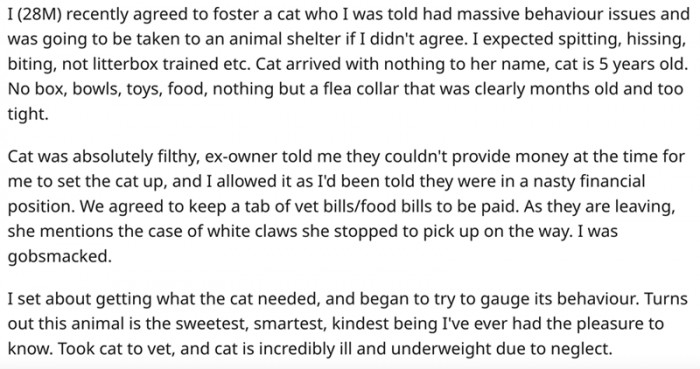
OP was quiet about everything until it went too far. He couldn't bear the thought of another cat having to go through the same thing.
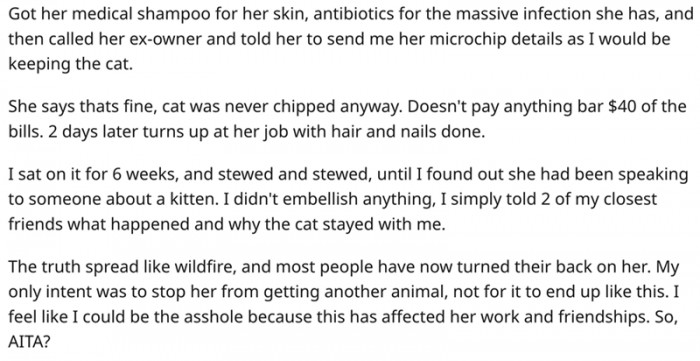
She does sound like a person who could kill a cactus.
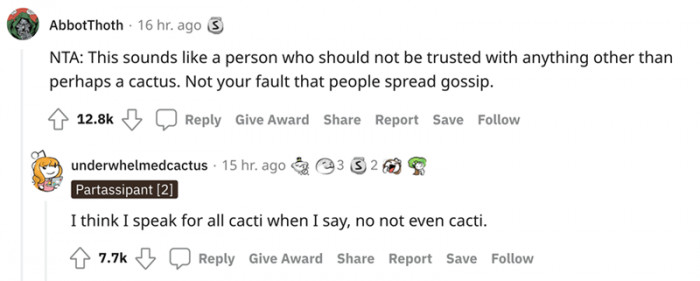
The Emotional Toll of Guilt
Guilt can be a complex emotion, often stemming from a perceived failure to meet personal or societal expectations. According to research published in the journal Emotion, guilt can lead to significant psychological distress, especially when it involves moral dilemmas such as the one faced by the individual who saved the kitty. This distress can be further compounded by the fear of social rejection or criticism, as highlighted in the work of Dr. Brené Brown, a researcher known for her studies on shame and vulnerability.
Dr. Brown emphasizes that guilt can serve a constructive function, motivating individuals to make amends or change behaviors that are misaligned with their values. However, when guilt becomes pervasive, it can hinder personal growth and well-being, leading to anxiety and depression. Understanding the nature of guilt can empower individuals to process their feelings more effectively and help them find ways to reconcile their actions with their moral compass.
Understanding the psychological dynamics of animal rescue can be informed by the principles of attachment theory. This theory, developed by Dr. John Bowlby, posits that early relationships shape our emotional responses and behaviors throughout life. Individuals who have secure attachments are often more adept at forming healthy relationships and engaging in altruistic behaviors, while those with insecure attachments may struggle with feelings of inadequacy and guilt when faced with moral choices.
Psychological professionals recommend that individuals who feel conflicted about their actions, such as exposing an abuser, engage in self-compassion practices. Self-compassion, as outlined by Dr. Kristin Neff, involves treating oneself with kindness during moments of failure or suffering, thus reducing feelings of guilt and shame. Techniques like mindfulness meditation or compassionate self-talk can help individuals process their emotions and foster a more supportive internal dialogue, allowing them to navigate complex moral landscapes with greater ease.
OP did the right thing and ensured that every shelter knows not to allow her to adopt any more animals.
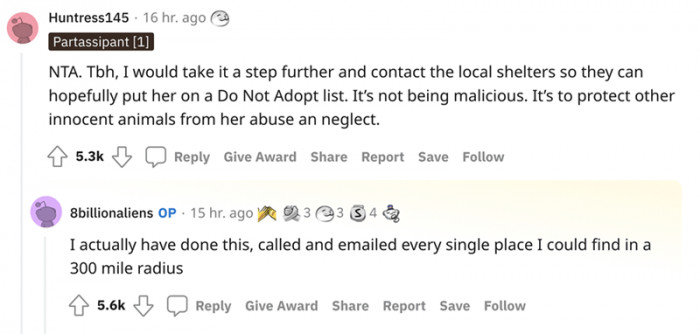
According to OP, some people sided with the ex-owner, showering her with excuses and telling him to be more understanding.
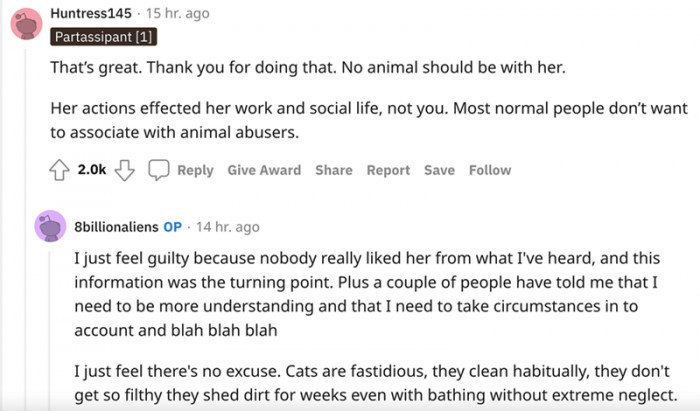
People on Reddit made sure that OP doesn't feel any guilt about his actions.
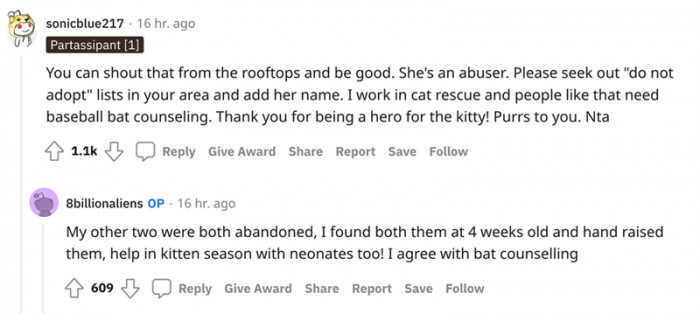
The act of intervening in situations of animal abuse, as seen in this story, often taps into a deep-seated moral obligation to protect vulnerable beings. A study conducted by researchers at the University of Pennsylvania found that people who feel a strong sense of empathy are more likely to engage in altruistic behaviors, such as rescuing animals from harmful environments. This is supported by the concept of 'empathic concern,' where individuals experience a heightened emotional response to the suffering of others, compelling them to take action.
Moreover, the psychological principle of 'cognitive dissonance' suggests that when individuals act in a way that contradicts their beliefs about right and wrong, they may experience an internal conflict that can lead to feelings of guilt. In this case, the individual who saved the kitty might struggle with reconciling their heroic act with the consequences of exposing the previous owner, which highlights the complexity of moral decision-making. Addressing these feelings through reflective practices, such as journaling or therapy, can facilitate a healthier resolution and promote emotional well-being.
It's a terrifying image to think about: an adult cat the size of a kitten, all because she lacked proper care.
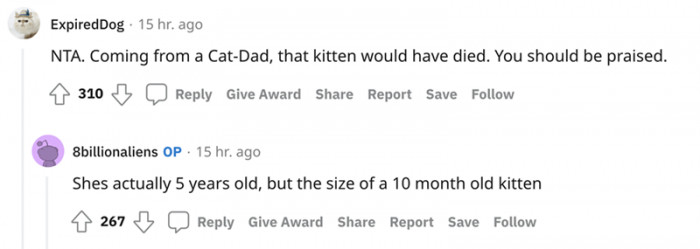
OP isn't sparing any expense in order to save this kitty. Huge respect for this person.
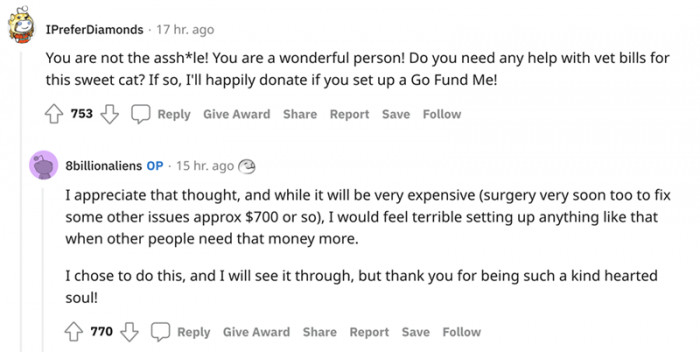
Imagine how much you have to neglect a poor kitty to get it to this point.
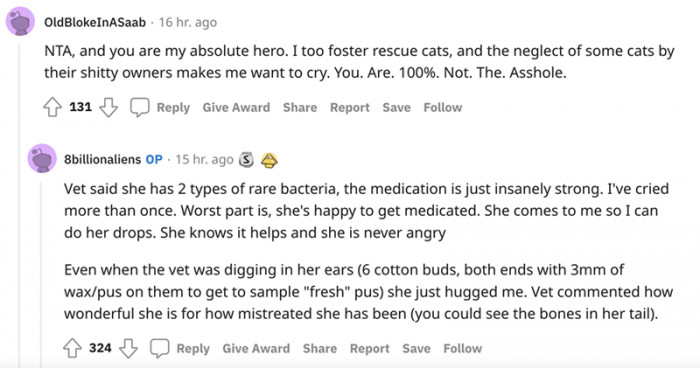
Social Support and Its Impact
Social support plays a crucial role in mitigating feelings of guilt and fostering resilience in challenging situations. Research from the American Psychological Association indicates that individuals who have a strong support network are better equipped to cope with negative emotions and stressors. In the context of this story, the encouragement from the Reddit community serves as a vital source of affirmation and validation, helping the rescuer navigate his feelings of guilt.
Dr. Julianne Holt-Lunstad, a psychologist at Brigham Young University, has conducted extensive research on social relationships and health, demonstrating that perceived social support can buffer against the mental health impacts of stress. This underscores the importance of community in fostering emotional well-being, especially when facing moral dilemmas. Encouraging open dialogue and sharing experiences with supportive peers can help individuals process their feelings more effectively and reinforce a sense of belonging, which is essential for emotional resilience.
Hopefully, no one else will ever allow her to adopt another poor animal again.

It's absolutely gut-wrenching to read a story like this, along with the comments OP left that further described how poorly that poor cat was treated. It takes a truly awful person to do something like this, and there are no excuses for such behavior.
Psychological Analysis
This story highlights how complex guilt can be, especially when someone feels torn between their moral responsibility and the consequences of their actions. The individual's decision to expose the previous owner reflects a strong sense of empathy and a desire to protect a vulnerable creature, which is a powerful motivator for altruistic behavior. However, their subsequent guilt underscores the internal conflict many people face when navigating moral dilemmas—it's a reminder that even well-intentioned actions can lead to unexpected emotional fallout.
Analysis generated by AI
Understanding the interplay between guilt, empathy, and social support is crucial for individuals navigating moral dilemmas, particularly in situations involving the welfare of vulnerable beings. Mental health professionals recognize that guilt can be both a motivator for positive change and a source of distress, depending on how it is processed. By fostering self-compassion and seeking social support, individuals can better manage their emotions and make empowered decisions that align with their values. Ultimately, integrating these psychological insights can lead to healthier coping mechanisms and contribute to a more compassionate society.



